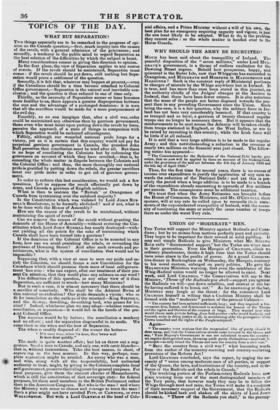TOPICS OF THE DAY.
WHAT BUT SEPARATION?
Two things especially are to be remarked in the progress of opi- nion on the Canada question,—first, much inquiry into the causes of the revolt, with a general admission of the grievances; and secondly, a tendency in the public mind to regard Separation as the best solution of the difficulties by which the subject is beset. Many considerations concur in giving this direction to opinion.
In the first place, the view of Separation applies to any course of events. If the revolt should be maintained, Separation must ensue : if the revolt should be put down, still nothing but Sepa- ration would prove a settlement of the question.
Secondly, it is felt that, whatever may happen at present,—even if the Canadians should for a time become attached to Colonial Office government,—Separation is the natural and inevitable con- clusion; and the question is thus reduced to one of time only. Thirdly, as the necessity of Separation sooner or later becomes more familiar to us,. there appears a greater disproportion between the cost and the advantage of a prolonged dominion: it is seen that all the sacrifices would be made for a mere postponement of the evil day. Fourthly, as no one imagiqes that, after a civil war, order could be maintained any otherwise than by garrison government, those even who most insist upon putting down the revolt by force, perceive the approach of a state of things in comparison with which Separation would be reckoned advantageous.
Fifthly, although our wounded national pride longs for a victory, yet as it is certain that this country would not pay for perpetual garrison government in Canada, the proudest John Bull perceives that conciliation must be tried after all. But there is no hope of conciliating the Colonists but by redressing the grievances on account of which they have revolted,—that is, by conceding the whole matter in dispute between the Colonists and the Colonial Office : and thus, the more thoroughly our national pride is gratified by putting down the rebels, the greater sacrifices must our pride make in order to get rid of garrison govern- ment.
In order to enforce this last consideration, we would ask a few questions. Let us suppose the revolt effectually put down by arms, and Canada a garrison of English soldiers. What is then to restrain the "British" or Orangemen of Canada from tyrannizing over the subdued majority ?
Is the Constitution which was violated by Lord Joust Rug- BELL'S Resolutions, to be formally abolished ? and if not, what is to be done with the House of Assembly? How are the causes of the revolt to be maintained, without maintaining the spirit of revolt? Can we remove the causes of the revolt without granting the demands of the House of Assembly—without restoring the Con- stitution which Lord JOHN RUSSELL has nearly destroyed—with- out yielding all the points for the sake of maintaining which Canada shall have been turned into a garrison?
If the dominion of the Colonial Office is to be asserted in any form, how can we avoid punishing the rebels, or rewarding the partisans of Downing Street? And after such rewards and pu- nishments, what is the system of conciliation that would not be - impossible ?
Supposing that, with a view at once to save our pride and sa- tisfy the Colonists, we should frame a new Constitution for the Canadians which should promise them more of local self-govern- ment than ever : who can expect, after our treatment of their pre- sent CO stitution, that they would place any reliance on our word ?
The difficulties of this question, in any other view of it than Separation, are sufficient to wreck—how many Ministries? But in such a case, it is almost necessary that there should be a sacrifice of somebody. Who shall be the Admiral BYNG of
this national mortification? Our pride demands a victim : who so fit for immolation as the authors of the mischief--King STEPHEN, and the drowsy, dawdling, do-nothing lord, who passes for his
chief ? Indeed, whichever plan we may adopt—whether coercion, conciliation, or separation—it would fail in the hands of the pre- Ent Colonial Office.
The coercion would be by halves; the conciliation a mockery and an affron: ; and the separation disgraceful in its mode. We come then to the when and the how of Separation.
The when is readily disposed of: the sooner the better- ,. If it were done, when 'tis done, then 'iwere well It were done quickly."
The mode is quite another affair; but let us throw out a sug- gestion. Send a man to Canada, and only one, with carte blanche— that is, without instructions. Take the best means, in short, of separaing in the best manner. In this way, perhaps, com- plete separation might be avoided. An envoy who was a man, 410 and who, along with all the responsibility, bad unlimited authority to treat, might, by giving to the Colonies complete local
self-govern ment, preserve their allegiance for general purposes. For local purposes, give them the ancient charter of Massachusetts, which is still the constitution of that sovereign state : for federal purposes, let them send members to the British Parliament rather than to the American Congress. But who is the man ? and where the Ministry with sense to choose and courage to trust the man ?
Such a plan might not have revolted Par, or CANNING, or even WELLINGTON. But with a Lord Gi.sfest.ca at the head of Colo-
nial affairs, and a Prime Minister without a will of his own, the best plan for an emergency requiring sagacity and vigour, is just the one least likely to be adopted. What to do, is the problem they cannot solve : so the whole matter is handed over to the Horse Guards.


























 Previous page
Previous page